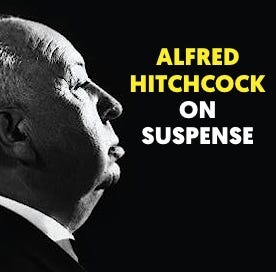How To Create Suspense Like Alfred Hitchcock
Expert Of The Day: Alfred Hitchcock
Alfred Hitchcock (1899-1980) is one of the most influential directors in the history of cinema. In his 60-year career, his films were nominated for a whopping 46 Academy Awards.
Today’s Lesson: How To Create Suspense
At the heart of writing is capturing and keeping attention. If you don’t master this skill, then your ideas are irrelevant—no matter how true they are. Suspense is a micro-skill that is a must-have for all non-fiction writers.
Clip Context
The featured clip is an interview that Hitchcock performed in the 1960s. I couldn’t find the source or exact date unfortunately.
At the end of the clip, I added a 1992 clip of mega bestselling author Donna Tartt sharing how she used Hitchcock's idea. This Tartt clip demonstrates how his simple idea has influenced greats across time.
Hitchcock’s Ticking Time Bomb Technique Will Help You Create Suspense
Conventional wisdom on suspense is that you need to leave out facts and then allude to them in order to create an open loop in the reader's mind that keeps them sticking around.
Hitchcock challenges this idea by going in the opposite direction. He says:
Suspense can only be achieved by telling the audience as much as you can.
By using this technique, Hitchcock makes the case that we achieve two things...
We create emotion rather than just intellectual curiosity.
We keep the reader gripped for longer.
To make his point, he gives an example of a scene with a ticking time bomb:
We could be blown up this minute and the audience will get five seconds of shock. But if we tell them five minutes ahead of time, there is a bomb that's going to go off. Now we get five minutes of suspense where we didn't have suspense before because the audience were in ignorance. You see? That's a big difference.
In this scene, tension is created because we don't know if and when the bomb will go off and where the main characters will be when it does.
Tartt uses this idea in her mystery book by revealing the name of the victim on the first page.
Personal Resonance
I first became interested in the suspense genre when Malcolm Gladwell mentioned that he was a thriller fanatic, and that it helped him write better non-fiction.
This quote stood out:
I think it should be as interesting to read about some fascinating idea from education as it is to read a thriller. I don't see any distinction between the two. I think they can excite and inform and inspire the way that fiction does.
How To Apply The Ticking Time Bomb Technique In Non-Fiction Articles (For Paid Subscribers)
Hitchcock and Tartt both explain how to use the technique in the context of a story. In the paid version of this lesson, I teach you my #1 way to apply it to articles. In addition, I also share a big meta-insight on how great writers learn from other genres of writing and other types of creators (ie - film directors).



